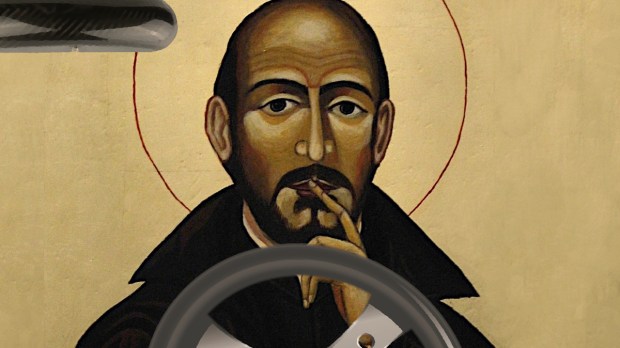Some time ago I took an online course about what St. Ignatius calls the discernment of spirits. It’s a series of videos (in Polish) about Ignatian spirituality and meditation. In the course of 3 weeks I learned about the Ignatian conscience exam. It’s a daily prayer where you spend 15 minutes examining your heart, feelings, desires and — most importantly in this context — the “motions of our soul.”
These motions are the thoughts that arise within us before we undertake an action. The Ignatian examination of conscience focuses our attention not so much on the act itself, but on the thought, the impulse, the stirring that led to it and the spirit behind it. Jesus himself says, “For it is from within, from the human heart, that evil intentions come: fornication, theft, murder…” (Mark 7:21). The heart, in the biblical sense of the word, means the center of human decision-making, where thoughts are formulated.
How does this relate to driving a car?
In many places, hardly a day goes by without news about some car accident that has caused major injuries or worse. Aggression, excessive speed, and drunk driving are just a few of the factors that cause these sad and avoidable incidents.
Anyone who drives a car also knows that it’s common to encounter other dangers and obstacles on the road. Although not always dramatic, these events often cause a rush of emotions that can be hard to control. Someone cuts us off, a car makes an illegal U-turn at an intersection, a motorcyclist who doesn’t respect the rules creates a dangerous situation, etc.
How do drivers react? With mounting anger, swearing or obscene gestures, insistent honking — or in extreme cases, by acts of violent aggression. Such reactions can generate a vicious cycle among drivers, because aggression breeds aggression.
Such behavior begins, however, when we label people in our thoughts, according to Julita Maleszewska, transportation psychologist at the Podlaskie Regional Occupational Medicine Center in Bialystok. She told TOKfm, “These can be so-called thought-labels such as ‘stupid driver,’ ‘what an idiot,’ or ‘how is he even allowed to drive?'”
Maleszewska also notes that men seem more prone to aggressive behavior than women. This is especially true for younger men, who can be overconfident. These impulses can affect people at any level of society. “(There) are some people who believe that their (socioeconomic) position is a pass to feel ‘important’ on the road and they demand that others conform to them,” said Maleszewska.
Staying safe on the road
If aggression on the road starts with a thought, a motion of the soul, how can I deal with it?
The first helpful step, which St. Ignatius himself teaches us, is to learn to recognize these motions, the thoughts that accompany us behind the wheel. Maleszewska also mentions this. “The instant we get behind the wheel, we have the potential to become agitated by traffic jams or other drivers, and if we are aware of this, then that’s already a positive step. That’s the first step toward dealing with the problem.”
It’s important to recognize the possible consequences of aggressive behavior. When explaining discernment and how to make good choices, St. Ignatius encourages people to imagine the consequences of their own actions. When I’m behind the wheel, it can be hard to envision what might happen if I act aggressively towards another driver, but it can be very useful to reflect upon these sorts of actions before or after driving.
Ultimately, it’s important to be understanding of others. The other drivers I encounter on the road are not puppets, but people. They have their own stories and problems. Maybe they’re in a hurry to get somewhere. Maybe they’re tired or are having a really bad day. In general, the behaviors that often annoy us on the road are not the result of malice, but of simple human error.
An argument from the Lord Jesus
There is another important reason to resist acting aggressively on the road. Jesus, from the Gospel according to St. Matthew in the Sermon on the Mount, gives an interpretation of the Decalogue. He says:
You have heard that it was said to those of ancient times, ‘You shall not murder’; and ‘whoever murders shall be liable to judgment.’ But I say to you that if you are angry with a brother or sister, you will be liable to judgment; and if you insult a brother or sister, you will be liable to the council; and if you say, ‘You fool,’ you will be liable to the hell of fire.
(Matthew 5:21-22)
Jesus’s admonition applies perfectly to road rage.
The next time someone cuts you off while you’re driving, instead of cursing them out in your mind, pay attention to the anger and rage that quickly builds up inside you. If you take a few breaths and calm down, you might find it in your heart to bless them. This would certainly be an Ignatian choice of what is deeper, better, and more pleasing to God.



